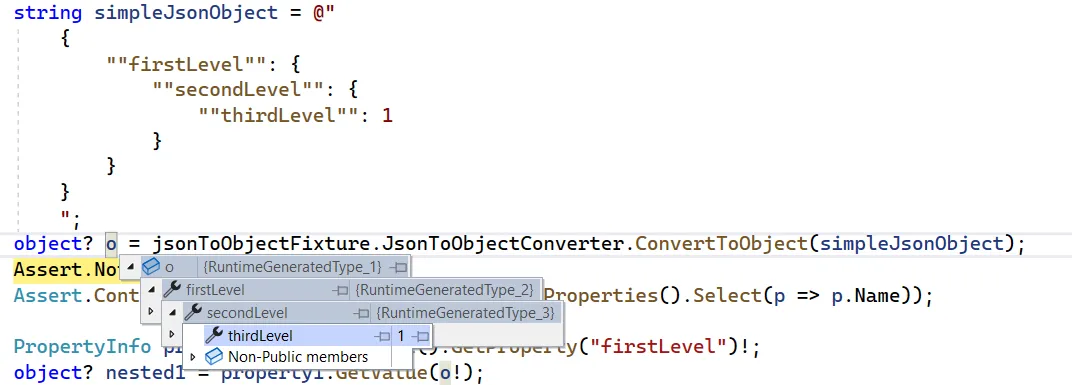我最终得到了一个简单的类,可以动态创建类型,实例化它们并填充数据,以反映输入JSON的结构。

你可以在这里找到它:
https://github.com/starnutoditopo/JsonToObject
JsonToObjectConverter.cs
using System.Globalization;
using System.Reflection;
using System.Reflection.Emit;
using System.Text.Json;
namespace JsonToObject;
public class JsonToObjectConverter
{
private class Counter
{
private ulong count;
public Counter()
{
this.count = 0;
}
public ulong Next()
{
this.count++;
return this.count;
}
}
private static ulong assemblyGenerationCounter;
private readonly JsonToObjectConverterOptions options;
static JsonToObjectConverter()
{
assemblyGenerationCounter = 0;
}
public JsonToObjectConverter()
: this(new JsonToObjectConverterOptions())
{
}
public JsonToObjectConverter(JsonToObjectConverterOptions options)
{
this.options = options;
}
public object? ConvertToObject(string jsonString)
{
JsonSerializerOptions opt = new JsonSerializerOptions()
{
PropertyNameCaseInsensitive = true
};
JsonElement rawResult = JsonSerializer.Deserialize<JsonElement>(jsonString, opt);
object? result = ToStronglyTypedObject(rawResult);
return result;
}
private object? ToStronglyTypedObject(JsonElement? nullableJsonElement)
{
string assemblyNameString;
ulong assemblyId = Interlocked.Increment(ref assemblyGenerationCounter);
try
{
assemblyNameString = string.Format(this.options.RuntimeGeneratedAssemblyNameTemplate, assemblyId.ToString(CultureInfo.InvariantCulture));
}
catch
{
throw new InvalidOperationException($@"Unable to generate assembly name using template '{this.options.RuntimeGeneratedAssemblyNameTemplate}' and id '{assemblyId}'. Please, review the {nameof(JsonToObjectConverterOptions.RuntimeGeneratedAssemblyNameTemplate)} property in the options.");
}
ModuleBuilder moduleBuilder = CreateModuleBuilder(assemblyNameString, this.options.RuntimeGeneratedModuleName);
Counter typeGenerationCounter = new Counter();
var result = ToStronglyTypedObject(nullableJsonElement, moduleBuilder, typeGenerationCounter);
return result;
}
private object? ToStronglyTypedObject(
JsonElement? nullableJsonElement,
ModuleBuilder moduleBuilder,
Counter typeGenerationCounter
)
{
if (nullableJsonElement == null)
{
return null;
}
JsonElement jsonElement = nullableJsonElement.Value;
switch (jsonElement.ValueKind)
{
case JsonValueKind.Undefined:
return null;
case JsonValueKind.String:
return jsonElement.GetString();
case JsonValueKind.False:
return false;
case JsonValueKind.True:
return true;
case JsonValueKind.Null:
return null;
case JsonValueKind.Number:
{
if (jsonElement.TryGetDouble(out var result))
{
return result;
}
}
throw new InvalidOperationException($"Unable to parse {jsonElement} as number.");
case JsonValueKind.Object:
{
ulong typeId = typeGenerationCounter.Next();
string typeName;
try
{
typeName = string.Format(this.options.RuntimeGeneratedTypeNameTemplate, typeId.ToString(CultureInfo.InvariantCulture));
}
catch
{
throw new InvalidOperationException($@"Unable to generate type name using template '{this.options.RuntimeGeneratedTypeNameTemplate}' and id '{typeId}'. Please, review the {nameof(JsonToObjectConverterOptions.RuntimeGeneratedTypeNameTemplate)} property in the options.");
}
TypeBuilder typeBuilder = CreateTypeBuilder(moduleBuilder, typeName);
Dictionary<string, object?> propertyValues = new Dictionary<string, object?>();
foreach (var property in jsonElement.EnumerateObject())
{
string propertyName = property.Name;
object? propertyValue = ToStronglyTypedObject(property.Value, moduleBuilder, typeGenerationCounter);
Type propertyValueType;
if (null == propertyValue)
{
propertyValueType = typeof(object);
}
else
{
propertyValueType = propertyValue.GetType();
}
CreateAutoImplementedProperty(typeBuilder, propertyName, propertyValueType);
propertyValues.Add(propertyName, propertyValue);
}
Type resultType = typeBuilder.CreateType()!;
object result = Activator.CreateInstance(resultType)!;
foreach (var pair in propertyValues)
{
var propertyInfo = resultType.GetProperty(pair.Key)!;
propertyInfo.SetValue(result, pair.Value);
}
return result;
}
case JsonValueKind.Array:
{
List<object?> list = new List<object?>();
foreach (var item in jsonElement.EnumerateArray())
{
object? value = ToStronglyTypedObject(item, moduleBuilder, typeGenerationCounter);
list.Add(value);
}
return list.ToArray();
}
default:
throw new InvalidOperationException($"Value type '{jsonElement.ValueKind}' is not supported");
}
}
private static ModuleBuilder CreateModuleBuilder(
string assemblyNameString,
string moduleName
)
{
var assemblyName = new AssemblyName(assemblyNameString);
AssemblyBuilder assemblyBuilder = AssemblyBuilder.DefineDynamicAssembly(assemblyName, AssemblyBuilderAccess.Run);
ModuleBuilder moduleBuilder = assemblyBuilder.DefineDynamicModule(moduleName);
return moduleBuilder;
}
private static TypeBuilder CreateTypeBuilder(
ModuleBuilder moduleBuilder,
string typeName
)
{
TypeBuilder typeBuilder = moduleBuilder.DefineType(typeName, TypeAttributes.Public);
typeBuilder.DefineDefaultConstructor(MethodAttributes.Public);
return typeBuilder;
}
private static void CreateAutoImplementedProperty(
TypeBuilder builder,
string propertyName,
Type propertyType
)
{
const string PrivateFieldPrefix = "m_";
const string GetterPrefix = "get_";
const string SetterPrefix = "set_";
FieldBuilder fieldBuilder = builder.DefineField(
string.Concat(PrivateFieldPrefix, propertyName),
propertyType, FieldAttributes.Private);
PropertyBuilder propertyBuilder = builder.DefineProperty(
propertyName, PropertyAttributes.HasDefault, propertyType, null);
MethodAttributes propertyMethodAttributes =
MethodAttributes.Public | MethodAttributes.SpecialName |
MethodAttributes.HideBySig;
MethodBuilder getterMethod = builder.DefineMethod(
string.Concat(GetterPrefix, propertyName),
propertyMethodAttributes, propertyType, Type.EmptyTypes);
ILGenerator getterILCode = getterMethod.GetILGenerator();
getterILCode.Emit(OpCodes.Ldarg_0);
getterILCode.Emit(OpCodes.Ldfld, fieldBuilder);
getterILCode.Emit(OpCodes.Ret);
MethodBuilder setterMethod = builder.DefineMethod(
string.Concat(SetterPrefix, propertyName),
propertyMethodAttributes, null, new Type[] { propertyType });
ILGenerator setterILCode = setterMethod.GetILGenerator();
setterILCode.Emit(OpCodes.Ldarg_0);
setterILCode.Emit(OpCodes.Ldarg_1);
setterILCode.Emit(OpCodes.Stfld, fieldBuilder);
setterILCode.Emit(OpCodes.Ret);
propertyBuilder.SetGetMethod(getterMethod);
propertyBuilder.SetSetMethod(setterMethod);
}
}
JsonToObjectConverterOptions.cs
namespace JsonToObject;
public class JsonToObjectConverterOptions
{
private const string CONSTANTS_RuntimeGeneratedModuleName = $"RuntimeGeneratedModule";
private const string CONSTANTS_RuntimeGeneratedAssemblyNameTemplate = "RuntimeGeneratedAssembly_{0}";
private const string CONSTANTS_RuntimeGeneratedTypeNameTemplate = "RuntimeGeneratedType_{0}";
public string RuntimeGeneratedModuleName { get; set; } = CONSTANTS_RuntimeGeneratedModuleName;
public string RuntimeGeneratedAssemblyNameTemplate { get; set; } = CONSTANTS_RuntimeGeneratedAssemblyNameTemplate;
public string RuntimeGeneratedTypeNameTemplate { get; set; } = CONSTANTS_RuntimeGeneratedTypeNameTemplate;
}

System.Web.Helpers中有Json,在System.ServiceModel.Web中有JsonQueryStringConverter,在System.Web.Script.Serialization中有JavascriptSerializer,在System.Runtime.Serialization.Json中有DataContractJsonSerializer,甚至MS都决定在其ASP.NET Web API中包括第三方Json.NET。如果你觉得这还不够,MS正在开发System.Json,但目前不适合使用。微软太棒了,我选择最好看的命名空间。 - nawfalWindows.Data.Json中还有JsonValue,仅适用于 Windows 8 及以上版本。我很喜欢它。微软正在使命中 :) - nawfal